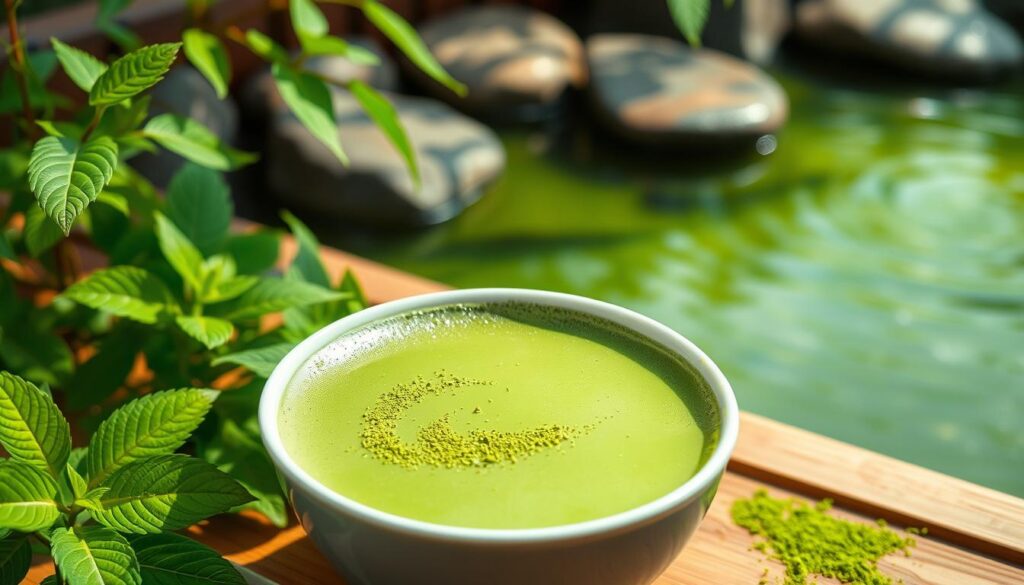Exploring green tea powder can change your health journey. Matcha is more than a drink; it’s a superfood with amazing health benefits. Drinking matcha every day can improve your health in ways you never thought possible.
Athletes, health lovers, and wellness experts around the world love matcha. This green powder is full of nutrients that help your mind stay sharp, your body perform better, and your energy stay up.
Key Takeaways
- Matcha provides comprehensive wellness benefits
- Green tea powder offers concentrated nutritional support
- Daily matcha consumption can improve mental focus
- Natural energy boost without caffeine crashes
- Rich in antioxidants and essential minerals
- Supports metabolic health and weight management
What is Matcha and Its Rich Cultural Heritage
Matcha is more than just a drink. It comes from centuries of Japanese tradition. This vibrant green tea powder offers a deep cultural experience. It’s known for its unique preparation and rich history, loved by tea lovers everywhere.
Traditional Japanese Tea Ceremony Origins
The Japanese tea ceremony, or chanoyu, started in the 12th century. It turned matcha from a medicinal drink to a spiritual practice. Zen Buddhist monks used it to stay alert during long meditation sessions.
The ceremony evolved into a sophisticated art form. It focuses on:
- Mindful preparation
- Respect for ritual
- Aesthetic appreciation
- Spiritual connection
“The way of tea is not about drinking, but about experiencing harmony, respect, purity, and tranquility.” – Traditional Japanese Tea Master
The Art of Matcha Cultivation
Matcha cultivation is a complex process that requires great skill. Tea plants are shaded before harvest. This increases chlorophyll and amino acid production, making matcha different from regular green tea.
| Cultivation Stage | Key Characteristics |
|---|---|
| Shading Period | 20-30 days before harvest |
| Harvest Time | Early May (first flush) |
| Processing Method | Stone-ground into fine powder |
Modern Popularity and Global Matcha Trend
Matcha has moved from traditional Japanese tea rooms to modern cafes worldwide. Its health benefits and unique taste have made it popular. The global matcha market is growing, showing its appeal beyond cultural boundaries.
The Science Behind Matcha's Unique Properties
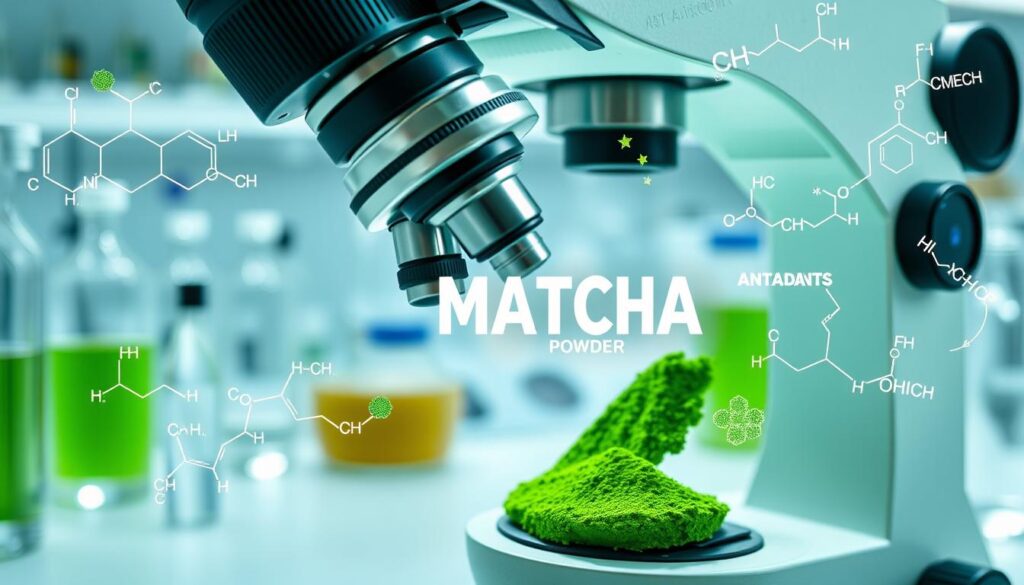
Matcha is a special green tea with a unique mix of natural compounds. It’s different from regular green tea because it’s packed with nutrients. This makes matcha a true superfood.
Matcha’s scientific makeup includes several key components:
- L-theanine: An amino acid that promotes relaxation without drowsiness
- Catechins: Potent antioxidants that support cellular health
- Chlorophyll: The pigment responsible for matcha’s vibrant green color
- Caffeine in matcha: A balanced energy source
“Matcha is not just a beverage, it’s a concentrated nutritional powerhouse” – Nutrition Science Review
Now, let’s dive into the details of these amazing compounds:
| Compound | Function | Health Impact |
|---|---|---|
| L-theanine | Amino Acid | Reduces stress, enhances mental clarity |
| Catechins | Antioxidant | Fights free radicals, supports metabolism |
| Chlorophyll | Natural Pigment | Detoxification, supports immune system |
| Caffeine | Stimulant | Provides sustained energy without crashes |
Matcha is more than just a drink. It’s a complex mix of nutrients that work together for health. Every sip offers a balanced blend of goodness for your well-being.
5 Health Benefits of Drinking Matcha Daily
Matcha is more than a trendy drink. It’s a green tea packed with health benefits. It can change your daily routine for the better. Let’s see how matcha can boost your health and energy.
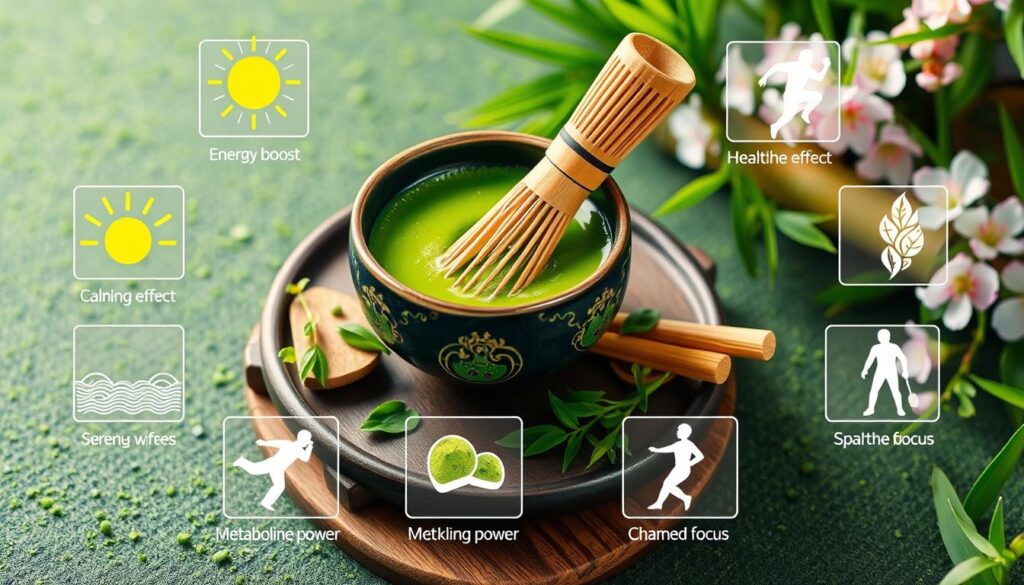
Enhanced Mental Focus and Cognitive Function
Matcha boosts your brain with caffeine and L-theanine. This mix gives you calm alertness. It improves your focus and concentration without the usual caffeine drop.
- Supports sustained mental performance
- Reduces mental fatigue
- Enhances brain wave stability
Natural Energy Without Jitters
Matcha gives you energy that lasts all day. Its caffeine is released slowly, giving you steady energy. This helps you stay productive without energy crashes.
Powerful Antioxidant Properties
Matcha is full of catechins, strong antioxidants. These fight off cell damage. They are more concentrated in matcha than in regular green tea, offering better protection.
| Antioxidant Type | Matcha Concentration | Health Impact |
|---|---|---|
| Catechins | 137x Green Tea | Cellular Protection |
| EGCG | Highest in Matcha | Cancer Prevention |
Weight Management Support
Studies show matcha can help with weight loss. It boosts metabolism and fat burning. It’s a great addition to a healthy diet.
Immune System Strengthening
Matcha is rich in vitamins, minerals, and polyphenols. These nutrients boost your immune system. Drinking it regularly can help fight off illnesses.
“Matcha is not just a drink, it’s a natural wellness strategy” – Wellness Research Institute
How Matcha Supports Your Weight Loss Journey
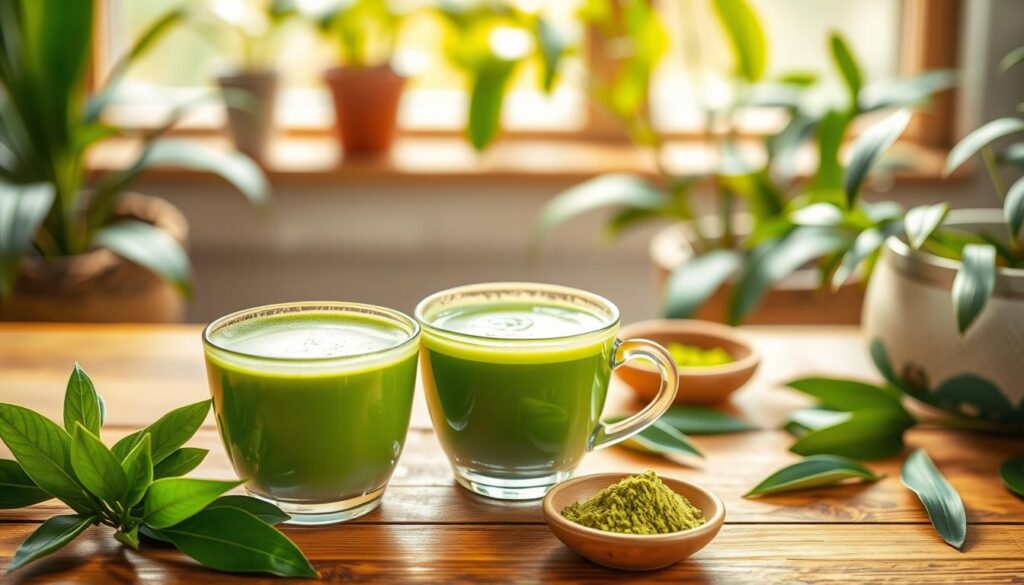
Matcha is a great ally for those trying to lose weight. It’s not just tasty; it also has special benefits for your metabolism. This green tea powder can help you reach your fitness goals.
Science shows matcha’s benefits for weight loss are real:
- Metabolism boost through enhanced thermogenesis
- Fat burning capabilities
- Natural appetite suppression
Matcha’s magic comes from its mix of caffeine and catechins. These ingredients speed up your metabolism and help burn fat. Studies show matcha can increase calorie burn by up to 25% during workouts.
“Matcha is not just a drink, it’s a metabolic catalyst for weight management” – Nutrition Experts
To understand matcha’s role in weight loss, let’s look at its special features:
| Property | Weight Loss Impact |
|---|---|
| EGCG Antioxidants | Increases fat metabolism |
| L-Theanine | Reduces stress-related eating |
| Caffeine | Boosts energy expenditure |
To get the most out of matcha, add it to a healthy diet and exercise plan. Whether it’s your morning drink or a pre-workout boost, matcha is a natural way to support your fitness goals.
Matcha vs Regular Green Tea: Understanding the Difference
Tea lovers often ask what makes matcha special compared to regular green tea. Both come from the same plant, but their making and nutrients are quite different.
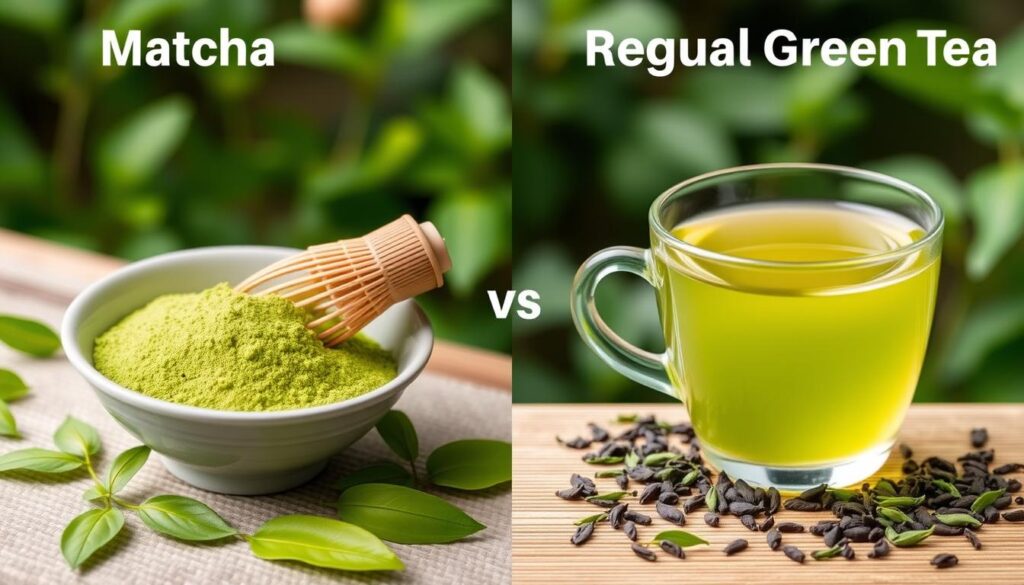
Nutrient Content Comparison
Matcha has more nutrients than regular green tea. Drinking matcha means you get the whole leaf, packed with nutritional benefits in a concentrated form.
| Nutrient | Matcha | Regular Green Tea |
|---|---|---|
| Antioxidants | 137x higher | Standard levels |
| Caffeine | 70mg per cup | 35mg per cup |
| L-Theanine | Higher concentration | Lower concentration |
Processing Methods
Tea making is key to matcha’s special taste. Tea plants are grown in the shade, boosting chlorophyll and amino acids. The leaves are picked by hand, steamed, dried, and ground into a fine powder.
- Shade-grown for 20-30 days before harvest
- Entire leaf consumed
- Minimal oxidation during processing
Health Impact Variations
Matcha and green tea have different health benefits. Matcha gives more energy, better focus, and stronger antioxidants.
“Matcha is not just a beverage, it’s a concentrated wellness experience.” – Tea Research Institute
While both teas are healthy, matcha’s special making and nutrient density make it better for those looking for the most benefits.
Best Times to Drink Matcha for Maximum Benefits
Knowing when to drink matcha can really boost your day. Matcha works with your body’s natural rhythms in special ways. This makes it key to drink it at the right times for the best effects.
- Morning energy boost
- Afternoon cognitive enhancement
- Pre-workout performance
- Stress management
Studies show the best times to drink matcha match your body’s natural energy peaks. The morning, from 10 AM to 11:30 AM, is perfect. This is when your cortisol levels are just right.
| Time of Day | Matcha Benefits | Recommended Serving |
|---|---|---|
| Morning (10-11:30 AM) | Mental clarity, sustained energy | 1 tsp matcha powder |
| Early Afternoon (2-3 PM) | Cognitive performance, metabolism boost | 1/2 tsp matcha powder |
| Pre-Workout (30-45 mins before) | Enhanced physical performance | 1 tsp matcha powder |
Pro tip: Don’t drink matcha too close to bedtime. Its caffeine can mess with your sleep. Match your matcha drinking to your body’s natural rhythm.
“Timing is everything when it comes to maximizing matcha’s potential health benefits.” – Wellness Nutrition Research Institute
By timing your matcha right, you can get the most out of it. It can give you energy, focus, and better overall health.
Choosing High-Quality Matcha: A Buyer's Guide
Finding the perfect high-quality matcha can be fun but tricky. Knowing what makes premium matcha special helps you choose well.
Color and Texture Indicators
Premium matcha shows itself through certain looks and feels. Here are the main signs:
- Vibrant jade-green color – a sign of exceptional quality
- Fine, silky powder texture
- Smooth consistency without clumping
- Minimal graininess when rubbed between fingers
Origin Considerations for Matcha Sourcing
Where matcha comes from is key to its quality. Real Japanese matcha, especially from Uji in Kyoto, is the top choice for quality tea.
“The origin of matcha is as important as its preparation” – Japanese Tea Master
Price and Quality Factors
Knowing about matcha prices helps you spend wisely. Here’s a quick guide:
- Ceremonial grade: Highest quality, most expensive
- Premium grade: Excellent for daily drinking
- Culinary grade: Best for cooking and blending
Even though higher prices mean better quality, always check the matcha grades and where it’s from before buying.
Creative Ways to Incorporate Matcha Into Your Diet
Matcha is more than just a tea. It’s a green powder that can make your meals and snacks healthier and tastier. It’s a versatile ingredient that can change your daily food choices.
- Energizing Matcha Smoothies: Blend matcha with banana, spinach, and almond milk for a nutrient-packed morning boost
- Creamy Matcha Latte: Whip up a smooth, comforting drink that replaces your regular coffee routine
- Decadent Matcha Desserts: Experiment with matcha-infused cookies, cakes, and ice cream
Matcha is great for cooking. It adds a unique twist to your dishes. Here are some recipe ideas to try:
| Meal Type | Matcha Recipe Idea | Difficulty Level |
|---|---|---|
| Breakfast | Matcha Overnight Oats | Easy |
| Snack | Matcha Energy Balls | Medium |
| Dessert | Matcha Cheesecake | Advanced |
“Matcha is not just a drink, it’s a culinary adventure waiting to be explored!” – Culinary Expert
Pro tip: Start with a small amount of matcha in your recipes. Its flavor is strong, so add more as you get used to it.
Matcha can be used in everything from smoothies to desserts. It adds flavor and health benefits. Get ready to turn your kitchen into a matcha haven!
Conclusion
Matcha is more than just green tea. It’s a powerful drink that can change your health routine. It boosts mental clarity, energy, and overall well-being. It’s a lifestyle choice that goes beyond just drinking.
Matcha is packed with nutrients. It boosts metabolism and supports your immune system. It’s a natural way to stay healthy and feel good.
Adding matcha to your daily routine is a big step for your health. Start with a little and see how it fits into your life. You can enjoy it as tea, latte, or smoothie. Find your favorite way to make it.
Matcha is not just a drink; it’s a way to care for your body and mind. It has a rich history and science backs its benefits. It’s a natural way to increase your energy and well-being.
FAQ
What exactly is matcha?
Matcha is a finely ground green tea powder from Japan. It’s made from special green tea leaves. Unlike regular green tea, you drink the whole leaf, getting more nutrients and antioxidants.
How does matcha differ from regular green tea?
Matcha is more packed with nutrients because you drink the whole leaf. It has more antioxidants, chlorophyll, and L-theanine than steeped green tea.
Is matcha safe to drink daily?
Yes, matcha is safe for daily use. But, limit it to 1-2 cups a day because of caffeine. If you’re sensitive to caffeine or have health issues, talk to your doctor first.
Can matcha help with weight loss?
Matcha can aid in weight loss by boosting metabolism and fat burning. Its caffeine and catechins help burn calories and support a healthy weight loss plan.
What time of day is best to drink matcha?
Most enjoy matcha in the morning or early afternoon. It gives a smooth energy boost without coffee’s jitters.
How do I choose high-quality matcha?
Choose bright green, fine powder matcha from Japan. High-quality matcha tastes smooth and sweet, with a vibrant green color.
Are there any side effects of drinking matcha?
Matcha is usually safe, but some might feel jittery or have sleep issues. Start with small amounts to see how you react.
Can people with caffeine sensitivity drink matcha?
Those sensitive to caffeine should be careful. Matcha has less caffeine than coffee but still affects you. Try decaf or ask a doctor for advice.
How should I prepare traditional matcha?
To make traditional matcha, whisk it with hot water in a bamboo whisk called a chasen. Aim for a smooth, frothy drink in a ceremonial bowl called a chawan.
Can children drink matcha?
No, matcha is not good for young kids because of caffeine. Talk to a pediatrician about safe caffeine levels and alternatives for kids.

